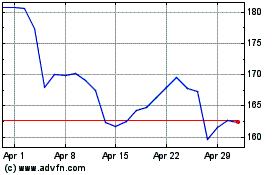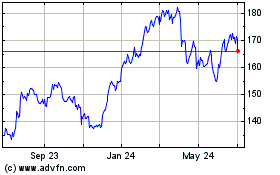By Jared S. Hopkins
This article is being republished as part of our daily
reproduction of WSJ.com articles that also appeared in the U.S.
print edition of The Wall Street Journal (June 26, 2019).
Pricing pressures and patent expirations for top-selling drugs
are opening up opportunities for pharmaceutical companies to make
major deals at relatively bargain prices. But questions remain
about whether the transactions will lead to long-term growth.
AbbVie Inc.'s $63 billion planned acquisition of Allergan PLC
announced Tuesday is the latest example of two challenged
pharmaceutical companies hoping to be more successful as a combined
entity. Similar scenarios helped bring together Takeda
Pharmaceutical Company Ltd. and Shire PLC last year, as well as
Bristol-Myers Squibb & Co. and Celgene Corp. in January.
AbbVie is facing pressure to navigate the end of patent
protection for the world's top-selling drug, Humira, a rheumatoid
arthritis treatment that accounts for more than half of its
revenue. Allergan, which dominates the $8 billion-plus market for
anti-wrinkle drug Botox and other beauty drugs, is losing patent
protection for its No. 2-selling drug Restasis and has struggled
with its drug-development program, sowing doubts that have
pressured shares.
The Allergan deal surprised analysts, who said AbbVie's
acquisition reflected diversification and short-term growth, rather
than advancing innovative science like recent deals that have
largely focused on the cancer space. Both companies have suffered
from disappointing clinical outcomes outside of their core
franchises.
"This is a play from the traditional playbook of 'when facing
challenges, go and buy someone,' " said David Maris, an analyst at
Wells Fargo & Co. who covers the industry.
In that sense, much of the deal's logic followed the industry's
two other recent big mergers.
Bristol-Myers Squibb Co.'s blockbuster $74 billion deal to buy
rival Celgene Corp. created a cancer-drug powerhouse, but it was
largely driven by each player's need to find new revenue.
Bristol-Myers had lost its advantage in immunotherapy treatment of
lung cancer to rival Merck & Co. And Celgene struggled to find
new products whose sales could offset the looming patent expiration
of Revlimid for multiple myeloma.
Japan-based Takeda's $62 billion deal to buy Shire and its
rare-disease treatments -- its biggest deal ever -- made Takeda one
of the world's largest global pharmaceutical companies and enabled
it to expand its footprint as Japan became more vigilant in
drug-price controls. At the time, Shire's deal making saddled it
with debt and left some analysts and investors questioning whether
it overpaid for questionable assets, including a $32 billion
takeover of Baxalta Inc.
All three recent deals involved a large company buying a smaller
one that was reliant on a single dominant franchise, with few
drivers of short-term growth and trading at valuations lower than
normal, said Ronny Gal, an analyst at Sanford C. Bernstein &
Co. That suggests an emphasis on near-term benefits, which presents
an attractive opportunity for the buyer, Mr. Gal said.
"That was enough for strategic buyers to come in," Mr. Gal
said.
It has been a busy year in deal making for the health-care
sector, with deals in 2019 valued at more than $307 billion,
trailing only the computer and electronics sector, according to
data from Deal Logic.
In addition to the recent bigger deals, companies like Pfizer
Inc. and Merck & Co. have been acquiring smaller companies in a
race to bulk up their development pipelines.
Major deals came when the acquired companies were in severe
slumps after peak share prices. Celgene had fallen over 50% from
more than a year earlier when Bristol made its move. Allergan's
shares were down more than 50% from a peak in 2015.
Last year was quieter, in part because many potential targets'
valuations were out of reach, many analysts and industry officials
have said. The Takeda deal alone accounted for about half of the
drug industry's total deal value through the first nine months of
2018, according to EvaluatePharma.
Some industry observers believe that smaller and midsize deals
are likely to dominate the rest of the year. "I would guard against
thinking this is a trend that we should be expecting -- all of
these large pharma companies going out and gobbling up people,"
said Ambar Boodhoo, a partner at Ernst & Young who heads its
U.S. life-sciences deal making practice.
If the major deals this year aren't enough to boost longer-term
growth, companies will be going back to the trough for smaller
deals, some observers said.
Geoffrey Porges, an analyst at SVBLeerink LLC, said that by the
mid-2020s, both Bristol and AbbVie "better pull some rabbits out of
the hat" through deals or their pipelines in order to grow.
Meanwhile, some pharmaceuticals deals are drawing scrutiny from
the Federal Trade Commission over anticompetitive concerns -- and
even over drugs still in the pipeline.
On Monday, Bristol-Myers said its merger with Celgene would be
delayed as Celgene seeks to sell its blockbuster anti-inflammatory
drug Otezla to appease regulators. Otezla treats psoriasis, and
Bristol doesn't market a psoriasis drug currently, but it does have
an experimental drug in late stage trials.
Roche Holding AG said the FTC had asked for more information
regarding its planned takeover of Spark Therapeutics Inc.
Regulators may be focusing on overlap between Roche's hemophilia
treatment Hemlibra and Spark's experimental gene therapy for the
disease, analysts speculated.
While there is little in common between AbbVie and Allergan's
core franchises, overlapping gastrointestinal franchises will
likely need to be shed, according to Mr. Gal, the analyst. Allergan
currently sells Viberzi and Linzess, both of which are approved to
treat gastrointestinal ailments; AbbVie's Humira is also approved
to treat GI ailments including Crohn's disease.
(END) Dow Jones Newswires
June 26, 2019 02:47 ET (06:47 GMT)
Copyright (c) 2019 Dow Jones & Company, Inc.
AbbVie (NYSE:ABBV)
Historical Stock Chart
From Mar 2024 to Apr 2024

AbbVie (NYSE:ABBV)
Historical Stock Chart
From Apr 2023 to Apr 2024
